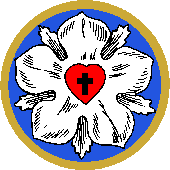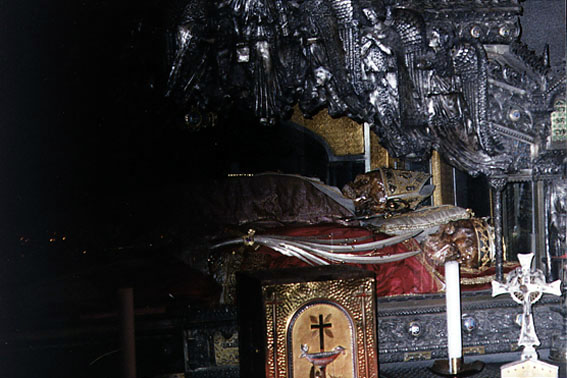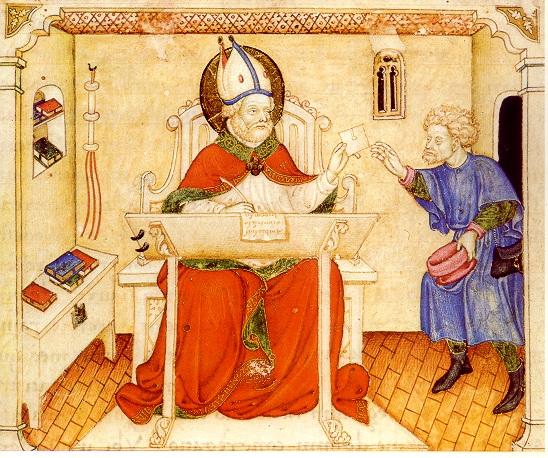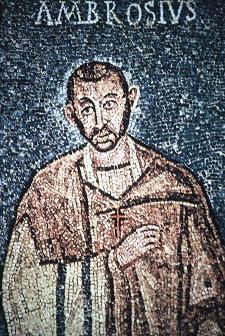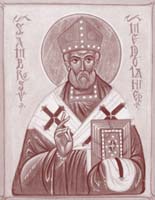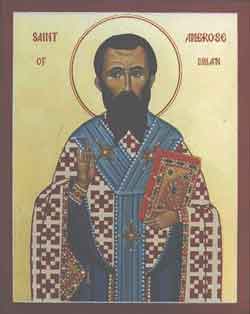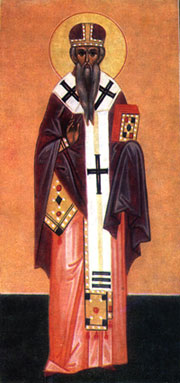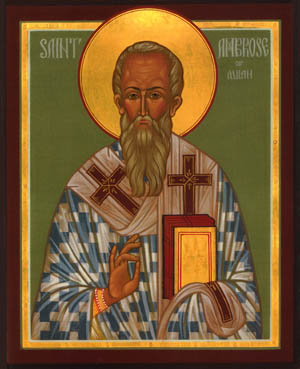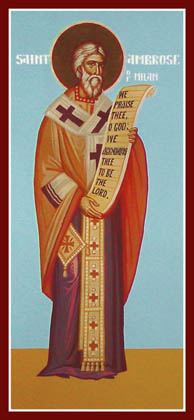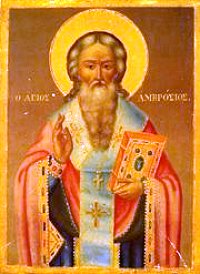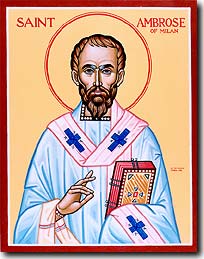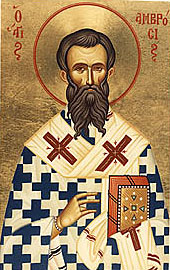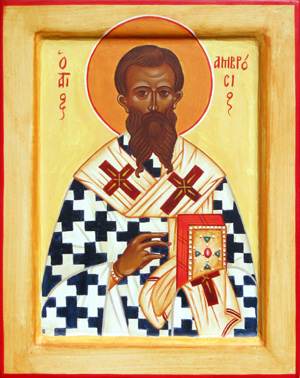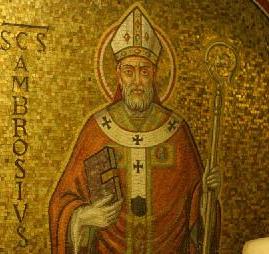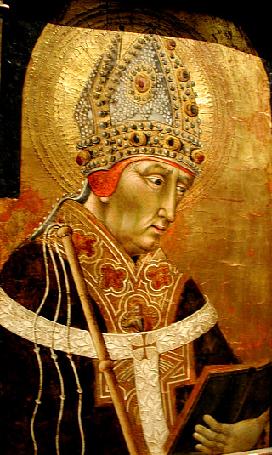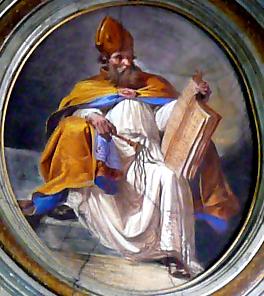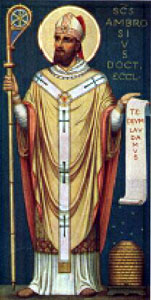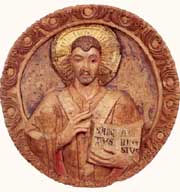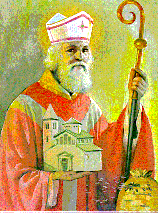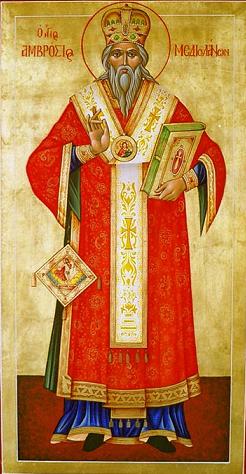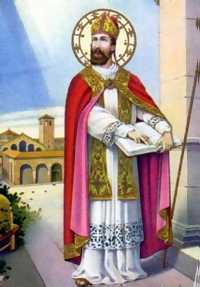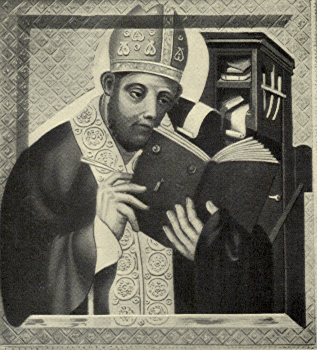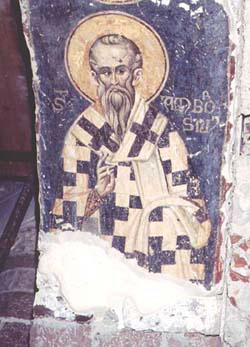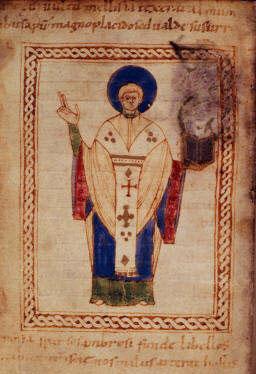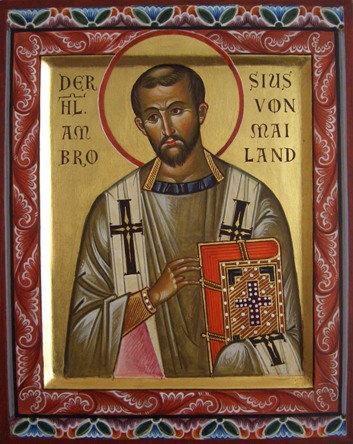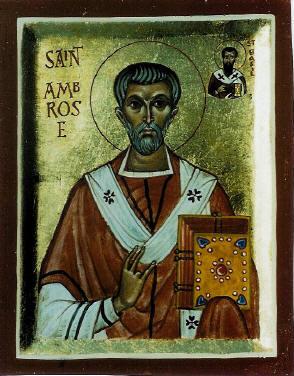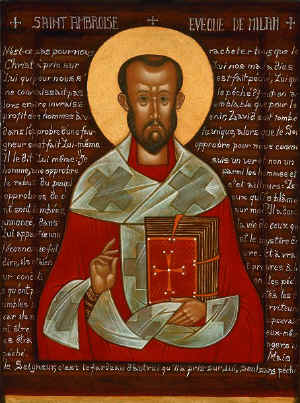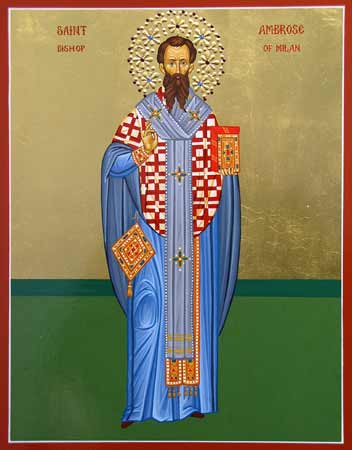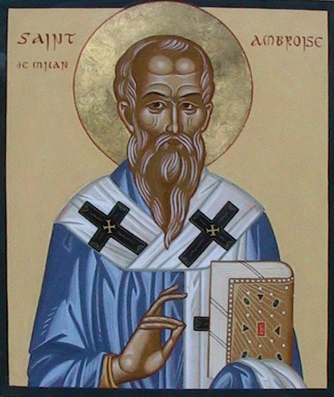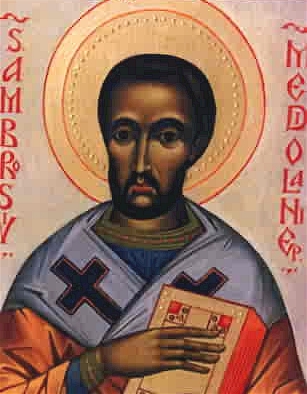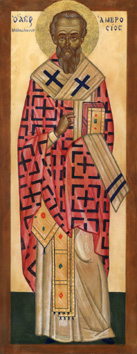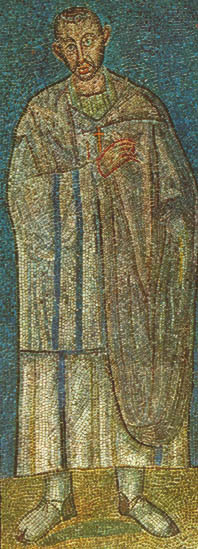QUOTATIONS FROM AMBROSE:
God by nature is uncompounded, joined to nothing, composed of nothing, to whom nothing happens by accident; but only possessing in His own nature that which is divine, enclosing all things, Himself closed out of nothing, penetrating all things, Himself never penetrable, everywhere complete, everywhere present at the same time, whether in heaven or on earth or in the depths of the sea, incapable of being seen or measured by our senses, to be followed only by faith and venerated in our religion.
(De Fide, 1.16, as quoted in Loci Theologici, Vol. I, p. 58)
God knows the future with as much certainty as He knows the present.
(as quoted in Loci Theologici, Vol. I, p. 206)
He took what is mine in order that He might impart to me what is His. He took it not to overturn it but to fill it.
(De Incarnationis Dominicae Sacramento, ch. 4, as quoted in The Two Natures in Christ, pp. 128 and 360)
In this matter [of the incarnation] my ignorance far surpasses my knowledge; but this one thing I know well, that I am ignorant of things which I cannot understand.
(De Incarnationis Dominicae Sacramento, ch. 3, as quoted in The Two Natures in Christ, p. 145)
The pious mind distinguishes between what is written with reference to the deity and with reference to the flesh, and thus avoids sacrilege.
(De Fide, Bk. 5, ch. 8, as quoted in The Two Natures in Christ, p. 182)
We must preserve the distinction between the deity and the flesh. The Son of God is described as one in both natures because both natures are in the same person. Although the same person speaks, He does not always speak in the same way, for as God He speaks divine things and as man the things which are human.
(De Fide, Bk. 2, ch. 9, as quoted in The Two Natures in Christ, p. 182)
The Lord of majesty is crucified, not as if we were to think He was crucified in His majesty, but rather because He is both God and man, God through the deity and man through the assumption of the flesh. Jesus Christ, the Lord of Majesty, is called the Crucified One because He is a participant in both natures, the human and the divine. In the nature of man He endures the Passion, and thus He is said to be indivisibly the Lord of Majesty and the Son of Man who was crucified.
(De Fide, Bk. 2, ch. 7, as quoted in The Two Natures in Christ, p. 182)
As man He is beaten...and crucified.
(De Fide, Bk. 2, ch. 7, as quoted in The Two Natures in Christ, p. 199)
Through His deity He is God, through the assumption of the flesh He is man. ...through the nature of man He grows tired. ...in the nature of man He is less than the Father. ...as God He speaks things which are divine, as man He says things which are human. By reason of the body He says, “Sit at My right hand” [Ps. 110:1].
(De Fide, Bk. 2, chs. 7-8, as quoted in The Two Natures in Christ, pp. 199)
He says, “Sit at My right hand” [Ps. 110:1], on account of the body, for it is quite a different matter to ask about the eternal seat of the Deity.
(De Fide, Bk. 2, ch. 12, as quoted in The Two Natures in Christ, p. 359)
Christ...according to the assumption of the flesh is of one substance with all men in the flesh, but the glory of His incarnation is unimpaired. ... According to His human condition and according to the incarnation...God is the Head of Christ, where He uses the form of a servant, that is, of a man and not of God.
(De Fide, Bk. 4, ch. 3, as quoted in The Two Natures in Christ, pp. 199 and 360)
In Christ the nature which we have in common with him, according to the flesh, has obtained the prerogative of the heavenly throne.
(On the Faith, book 5, chapter 6, as quoted in Catalog of Testimonies, p. 227)
In order that you do not refer the statement of Scripture, “God subjected all things to Him” [1 Cor. 15:27], to the infirmity of the Son, learn what is written concerning the Son in Phil. 3:21, “According to the power by which He is able to subject all things to Himself.” You have therefore learned that He is able to subject all things to Himself – according to the working of the deity, to be sure. Note, too, that He receives all things in subjection according to the flesh also, as it is written [Eph. 1:20-22], “Raising Him from the dead and establishing Him at the right hand in heavenly places above every principality and dominion, and above every name, He also subjects all things under His feet.” Therefore, also according to the flesh all things are given in subjection to Him, according to which He was also raised from the dead.
(De Fide, Bk. 5, ch. 15, as quoted in The Two Natures in Christ, p. 359; also quoted [in part] in Catalog of Testimonies, p. 227)
“It is not Mine to give” [Matt. 20:23]. ... The impossible was being asked, that men sit with the Son...while the angels stand in His presence (Luke 1:19); they stand before His throne (Rev. 7:11). ... The hosts of heaven stand around Him at the right and the left (1 Kings 22:19); there are thrones for the elders (Rev. 4:4), ...others for the apostles (Matt. 19:28); however, a share in His seat of honor is not given to the apostles but a share in the divine seat of honor is given to Christ according to His human nature.
(De Fide, Bk. 5, ch. 6, as quoted in The Two Natures in Christ, p. 360)
For God does not grant possession of his throne to the apostles, but he grants Christ, according to his humanity, possession of the divine throne.
(On the Faith, book 5, chapter 2, as quoted in Catalog of Testimonies, p. 227)
In Christ our common nature according to the flesh gained the honor of a heavenly seat.
(De Fide, Bk. 5, ch. 14, as quoted in The Two Natures in Christ, p. 360)
The nature of the human flesh must not be despised, for it was worthy to enter into the substance and fellowship of the Holy Trinity through our Lord Christ.
(De Resurrectione, as quoted in The Two Natures in Christ, p. 405)
[“The boy grew and gained in strength in the Spirit and was filled with wisdom, and the grace of God was upon Him” (Luke 2:40); “Jesus advanced in wisdom and age and in favor with God and men” (Luke 2:52).] The advance in age and wisdom does not belong to the divine but to the human nature; for how could the wisdom of God advance? ... Therefore he mentions His age that we might believe that this was spoken according to the human nature. For age does not belong to the deity but to the humanity. Therefore, if He advanced in the age of a man, He also advanced in the wisdom of a man. ... In what sense did He advance? Did the divine nature? If so, it would be changed by the advancement, for what advances is changed for the better. But what is divine is not changed; therefore, that which is changed is not divine. He advanced in the human sense. The power of God could not be strengthened...nor could God grow, nor can the height of God’s wisdom be augmented. Thus what was augmented was not God’s wisdom but ours.
(De Incarnatione, ch. 7, as quoted in The Two Natures in Christ, p. 249)
The angels adore not only the divinity of Christ, but also the footstool of His feet. ... Or if they deny that in Christ also the mysteries of the incarnation are to be adored, in which the very marks of His deity are seen and where we note the sure paths of the heavenly Logos, they should read that the apostles also adored Him when He rose in the glory of His flesh [Luke 24:52]. ... The prophet says [Ps. 99:5] that the earth which the Lord Jesus took upon himself, when he took on flesh, should be adored. Therefore by “footstool” we understand the earth, and by this earth we understand the flesh, which we today also adore in the mysteries [i.e. in the celebration of the Lord’s Supper] and which the apostles adored in the Lord Jesus, as we have said above.
(De Spiritu Sancto, Bk. 3, ch. 11, as quoted in The Two Natures in Christ, pp. 360 and 420, and in Catalog of Testimonies, p. 231; also quoted [in part] in Examination of the Council of Trent, Part II, p. 278)
Thomas had reason for amazement when he saw Christ’s body come in unhindered through doors which were barred to [normal human] bodies, since all the doors were closed [cf. John 20:26-28]. ... Christ penetrated closed doors not by His incorporeal nature but with a quality of the body of the resurrection.
(Exposition of the Gospel According to Luke, 24:36, as quoted in The Two Natures in Christ, p. 360)
We are free to be ignorant [about the day on which angels were created] because we neither must nor can know.
(as quoted in Loci Theologici, Vol. I, p. 165)
Paul explains himself in most of his epistles in such a way that whoever treats them may find nothing of his own to add, or if he wants to say something, he performs the office of a grammarian rather than that of an expounder.
(Bk. 2, Letter No. 7, as quoted in Examination of the Council of Trent, Part I, p. 167)
He [Paul] speaks with us in this way [clearly], that we may understand his speech.
(Bk. 3, Letter No. 5, as quoted in Examination of the Council of Trent, Part I, p. 167)
We believe fishermen, not dialecticians.
(as quoted in Loci Theologici, Vol. I, p. 107)
Let the Word of God come; let it enter the church; let it become a consuming fire, that it may burn the hay and stubble, and consume whatever is worldly; there is heavy lead of iniquity in many; let it be molten by divine fire; let the gold and silver vessels be made better, in order that understanding and speech, refined by the heat of suffering, may begin to be more precious.
(On Psalm 118, Sermon 13, as quoted in Examination of the Council of Trent, Part III, pp. 349-50)
What is evil unless it is the absence of good?
(quoted in Augustine, Contra Julianum, 1.7, as quoted in Loci Theologici, Vol. I, p. 203)
That soul is not in the image of God in which God is not always present.
(Hexaemeron VI, 8, 45, as quoted in Apology II:19, The Book of Concord, p. 115)
Before we are born we are defiled with contagion, and before the enjoyment of light we receive the injury of [our] very origin. For we are conceived in iniquity [cf. Ps. 51:5]. ... Birth itself has its contagions, and not only one, but nature itself has contagion.
(Apologia David, ch. 11, as quoted in Loci Theologici, Vol. I, p. 278)
All of us human beings are born under sin, and our very origin is in sin, as David says, “I am conceived in iniquities” [Ps. 51:5].
(Cont. Novat., as quoted in Loci Theologici, Vol. I, p. 278)
As soon as the act of conception has occurred and pregnancy has resulted, the disease of lust begins.
(as quoted in Loci Theologici, Vol. I, p. 287)
Adam secured this obnoxious heritage of human succession.
(Apologia David, ch. 13, as quoted in Loci Theologici, Vol. I, p. 278)
The conflict between the flesh and the Spirit, because of the sinfulness of man, revolves around his [man’s] nature.
(as quoted in Loci Theologici, Vol. I, p. 299)
Original concupiscence is that which makes an easy little entrance for lusting, and renders the adult lustful.
(as quoted in Loci Theologici, Vol. I, p. 314)
Sin is the transgression of the divine law and disobedience of the heavenly precepts.
(as quoted in Loci Theologici, Vol. I, p. 268)
Feed him who is dying of hunger; if you have not fed him you have killed him.
(Exposition of Psalm 118, Sermon 12, 44, as quoted in Loci Theologici, Vol. II, p. 406; also quoted in Treatise on Good Works, p. 109)
The passions of the soul are pride, avarice, ambition, strife, envy; the vices that cling to the body are the desire for eating, prodigality of wantonness and licentiousness. Temperance greatly restrains the ardor of these passions. It first tempers the spirit with sobriety and moderation, and informs the mind; then it also reins in the bodily fierceness through abstinence from pleasures. Temperance is therefore a teacher who shows the way of corrective discipline, reining in desires.
(De Jacob et vita beata, as quoted in Examination of the Council of Trent, Part IV, p. 310)
Every man is a liar, and no one is without sin except the one God. It has therefore been held that from man and woman, that is, through the mingling of their bodies, no one is thought to be without defect. But he who is without defect is also without this conception.
(On Isaiah, as quoted in Examination of the Council of Trent, Part I, p. 378)
For of all those born of a woman it is the holy Lord Jesus alone who does not feel the contagions of earthly corruption because of the uniqueness of His unstained birth.
(On Luke, as quoted in Examination of the Council of Trent, Part I, p. 378)
I do not believe that Christ should be excused [from this suffering of sorrow], but at no point do I marvel more at His dutifulness; He would have bestowed less on me if He had not taken on Himself my infirmity.
(Exposition of the Gospel According to Luke, Book 10, 55, as quoted in Loci Theologici, Vol. I, p. 111; also quoted in The Two Natures in Christ, p. 62)
The Pelagians make void infant baptism, although John testifies: “Behold, the Lamb of God, who takes away the sin of the world.” ... As now the institution of the Savior remains in the church, who says: “Unless one is born of water and the Spirit, he will not enter the kingdom of God,” so precaution was taken in the Law in connection with circumcision that, unless a person was circumcised on the eighth day, he was to be banished.
(Bk. 10, epistle 89, as quoted in Examination of the Council of Trent, Part I, p. 251)
John baptized for the remission of sins, not in his own name but in the name of the coming Jesus. And therefore those did not know the Spirit who had not received Baptism in the name of Christ, as John was accustomed to baptize [cf. Acts 19:1-7]. For though John did not baptize with the Spirit, nevertheless he preached both Christ and the Spirit. Therefore these [“disciples” who had received from someone else a so-called “baptism of John”], because they had been baptized neither in the name of Christ nor with the faith of the Spirit, were not able to receive the [true] sacrament of Baptism; therefore they were baptized in the name of Jesus, and in them Baptism was not repeated but renewed, for there is but one Baptism. However, where there is not the full sacrament of Baptism, there is thought to be neither the beginning nor any kind of Baptism; however it is full if you confess the Father, Son, and Holy Spirit.
(De Spiritu Sancto, Bk. 1, ch. 3, as quoted in Examination of the Council of Trent, Part II, p. 123)
...he is justified from sin to whom all sins are remitted through Baptism.
(quoted in Augustine, Contra Julianum, Bk. 2, 8.23; as quoted in Examination of the Council of Trent, Part I, p. 475; also quoted in Loci Theologici, Vol. II, p. 482)
We are not to be in doubt about the merits of Valentinianus [who died while still a catechumen, before baptism]; we should rather believe the testimonies of the angels that, after the fall into sin has been wiped away, he whom his faith has washed ascends cleansed. Let us believe that he has ascended from the desert, that is, from a dry and uncultivated place, to those flowering delights where, joined to his brother, he enjoys the pleasure of eternal life. Both are in bliss, if my prayers avail anything; no prayer of mine shall pass over without honoring you; in all my offerings I shall celebrate you. Who will forbid me to call you innocent?
(as quoted in Examination of the Council of Trent, Part III, p. 271)
I will glory not because I am righteous but because I am redeemed; I will glory not because I am free from sins but because my sins are forgiven me. I will not glory because I have done good nor because someone has done good to me but because Christ is my advocate with the Father and because the blood of Christ has been shed for me.
(De Jacob et vita beata, ch. 6, as quoted in Examination of the Council of Trent, Part I, p. 507)
...we are not justified by our works but by faith, since our fleshly weakness is an impediment to our works, but the clarity of faith which merits the forgiveness of sins overcomes the error of our works.
(De Jacob et vita beata, ch. 2, as quoted in Loci Theologici, Vol. II, p. 543; also quoted in Examination of the Council of Trent, Part I, p. 508)
It is faith that covers up our sins.
(De Apologia Prophetae David 13, 3, as quoted in Apology XII:96, The Book of Concord, p. 203)
No one rightly repents unless he hopes for indulgence from God through Christ.
(as quoted in Examination of the Council of Trent, Part IV, p. 148)
Therefore it is proper to believe both that we are to repent and that we are to be pardoned, but in such a way as to expect pardon from faith just as faith obtains it from the written agreement.
(Concerning Repentance II, 980, as quoted in Apology XII:96, The Book of Concord, p. 203)
He alone forgives sins who alone has died for sins.
(quoted in Peter Lombard, Sentences; as quoted in Examination of the Council of Trent, Part IV, p. 238)
Moreover, the world was subjected to him [God] through the law, because by the prescriptions of the law everyone was indicted and by the works of the law no one is justified. In other words, through the law sin is recognized, but its guilt is not relieved. The law was shown to be harmful since all are made sinners, but when the Lord Jesus came, he forgave the sin for everyone, which no one could avoid, and he blotted out the bill of indictment that stood against us by the pouring out of his blood [Col. 2:14]. This is what Paul says [Rom. 5:20], “the sin abounded through the law; but grace superabounded through Jesus.” For after the entire world was placed in subjection, he took away the sin of the entire world, just as John testified, saying [John 1:29], “Behold the Lamb of God, behold, the one who takes away the sin of the world.” And so let no one glory in works, because no one is justified by their deeds. But those who are righteous have it as a gift, because after the washing [of baptism] they were justified. It is faith, therefore, that frees people through the blood of Christ: “blessed are those whose transgression is forgiven, whose sin is covered” [Ps. 32:1].
(Epistle 73 [to Irenaeus], as quoted in Apology IV:103, The Book of Concord, pp. 137-38)
In this discussion that and how the bread of the Supper is the body of Christ should not be inquired after, nor the order of nature in this, since this same body is not according to the order of nature but was conceived by the Holy Spirit and born of the Virgin.
(Liber de mysteriis, as quoted in The Lord’s Supper, p. 183)
Because this sacrifice [i.e. the celebration of the Lord’s Supper] is offered in many places, does this mean there are many Christs? By no means, but the one Christ is everywhere, and He exists fully here and fully there, one body. For just as that which is offered everywhere is one body and not many, so also there is one sacrifice, which is the copy and the remembrance of His sacrifice offered on the cross.
(comments on Heb. 10, as quoted in The Lord’s Supper, p. 158)
Through all the rest that is said in what goes before the consecration [in the Lord’s Supper, through the Words of Institution], praise is rendered to God, entreaty is made by prayer for the people, for kings, for all others.
(De consecratione, 2, ch. Panis est, as quoted in Examination of the Council of Trent, Part II, p. 512)
[Before the consecration the celebrant prays:] “Deign to render this offering [of bread and wine] blessed, ascribed to us, approved, reasonable, acceptable.”
(De sacramentis, Bk. 4, ch. 5, as quoted in Examination of the Council of Trent, Part II, p. 519)
This bread is bread before the words of the Sacrament. But when the words of Christ come to it, it is the body of Christ. ... Before the words of Christ it is a cup full of wine and water. When the words of Christ become operative, the blood which has redeemed the people is caused to be there.
(De sacramentis, Bk. 4, chs. 4 and 5, as quoted in The Lord’s Supper, p. 156)
If there is such great power in the words of Christ that things which were not, now begin to be, how much more powerful are they, that they [the consecrated bread and wine] should be what they were and yet be converted into something else?
(De sacramentis, Bk. 4, as quoted in Examination of the Council of Trent, Part II, pp. 268-69)
If this is daily food, why do you take it only after a year has passed, as the Greeks in the East are wont to do?
(De sacramentis, Bk. 6, ch. 4, as quoted in Examination of the Council of Trent, Part II, p. 332)
If every time the blood is poured out it is poured out for the remission of sins, I ought to receive it always, that my sins may always be forgiven me; because I constantly sin, I constantly need to have the remedy.
(De sacramentis, Bk. 4, ch. 6, 28, as quoted in Examination of the Council of Trent, Part II, p. 354; also quoted [in part] in Lectures on Romans, p. 261)
As often as you drink, you receive remission of sins and become drunk in the Spirit.
(De sacramentis, Bk. 4, ch. 3, as quoted in Examination of the Council of Trent, Part II, p. 354)
If the blood of Christ, as often as it is shed [poured out], is shed [poured out] for sin, then I should properly receive it daily, because I sin daily.
(Exposition of Psalm 118, Sermon 18, 26, as quoted in Confession Concerning Christ’s Supper, pp. 329)
We eat the body of Christ in order that we may be able to be partakers of eternal life.
(Lucam, as quoted in Examination of the Council of Trent, Part II, p. 235)
This food which you are receiving [in the Lord’s Supper] supplies the substance of eternal life.
(De his qui initiantur mysteriis, ch. 8, as quoted in Examination of the Council of Trent, Part II, p. 235)
Consider whether the bread of angels is more glorious than the flesh of Christ, which surely is the body of life. ... And thus light is more powerful than darkness, true reality more powerful than a sign, the body of its Creator more powerful than the manna from heaven. ... To the people of that time the water flowed from the rock; to you the blood from Christ. Them He satisfied for an hour with water; you His blood washes forever.
(De his qui initiantur mysteriis, chs. 8-9, as quoted in The Lord’s Supper, pp. 244 and 261, and in Examination of the Council of Trent, Part II, pp. 355-56)
We must approach this table with fear, for our mind must understand that reverence is due Him whose body we are coming to receive. For the mind ought to judge this way within itself, because it is the Lord whose blood we drink in this mystery.
(as quoted in The Lord’s Supper, pp. 134-35)
[In the Sacrament you receive the whole Christ under both kinds] In order that the acceptance of the soul and of the flesh in Christ, and the liberation of both in you, may be signified. For that which we receive is able to guard body and soul, because the flesh of Christ is conveyed to us for the salvation of our body, but the blood for our soul. But if it were taken in one kind only, it would mean that it could guard only one, that is, either the body or the soul, but not both equally.
(quoted in Peter Lombard, Sentences; as quoted in Examination of the Council of Trent, Part II, p. 355)
Go to him and be absolved, because he is the forgiveness of sins. Do you ask who he is? Listen to him when he says [John 6:35], “I am the bread of life. Whoever comes to me will never be hungry, and whoever believes in me will never be thirsty.”
(Exposition of Psalm 118, c. 18, 28, as quoted in Apology XXIV:75, The Book of Concord, p. 271)
The Novatians say that they reserve the power to remit offenses to God alone. But Christ commanded the disciples to forgive sins.
(De poenitentia, Bk. 1, ch. 2, 6, as quoted in Examination of the Council of Trent, Part I, p. 601; also quoted in Loci Theologici, Vol. II, p. 510)
[But Peter said to him, ... “Repent, ...if perhaps the iniquity of your sin may be forgiven” (Acts 8:20,22).] I do not say [as do the Novatians] that Peter doubted, nor do I believe that so important a matter should be cut off by the judgment of one word. For Christ also says, Matt. 21:37, “Perhaps they will reverence my son.” And in John 8:19 He says, “If you knew Me you would have known My Father.” Nor could Peter doubt concerning the gifts of Christ, who had given him the power to remit sins.
(De poenitentia, Bk. 2, ch. 5, as quoted in Loci Theologici, Vol. II, p. 510; also quoted in Examination of the Council of Trent, Part I, p. 601)
I have forgiven you in the person of Christ... 2 Cor. 2:10.
(De Poenitentia, ch. 6, as quoted in Loci Theologici, Vol. II, p. 510)
The Word of God forgives sins; the priest is the servant, performing his own office, not exercising the rights of the power of another person.
(as quoted in Examination of the Council of Trent, Part II, p. 627)
He has deservedly become a great man whom the whole church has chosen [as its pastor], and it is rightly believed that he whom all the people requested has been elected according to the judgment of God.
(Bk. 10, Letter No. 82, as quoted in Examination of the Council of Trent, Part II, p. 710)
[In ordination] Man lays on hands; God bestows grace. The priest lays on his right hand in supplication, and God blesses with his powerful right hand.
(De dignitate sacerdotali, ch. 5, as quoted in Examination of the Council of Trent, Part II, p. 697)
He who without reproach is the husband of a wife is held to the law about accepting [i.e. is allowed to accept] the priesthood [cf. 1 Tim. 3:2, Tit. 1:6].
(as quoted in Examination of the Council of Trent, Part III, p. 130)
Virginity [remaining unmarried] is only something that can be recommended, but not commanded; it is voluntary rather than obligatory.
(Exhortation to Virginity 3, 17, as quoted in Apology XXIII:20, The Book of Concord, pp. 250-51)
For I think that I shall seem arrogant if I conceive a desire to teach among sons. I hope to attain not the grace of the prophets nor the strength of the evangelists nor the foresight of the pastors, but only application to and love for the divine Scriptures.
(De officiis, Bk. 1, as quoted in Examination of the Council of Trent, Part I, p. 260)
“I live because of the Father, and he who eats Me shall live because of Me” [John 6:58]. What is this...except that the Son vivifies man just as the Father vivifies the human flesh in the Son. For the abundance of grace is given to the condition of men because human nature is made alive in Christ. For when we have received the benefits of the Lord’s incarnation, we have to confess that we have fellowship in the spiritual life in the Son through His unity with our nature.
(De Fide, Bk. 4, ch. 10, as quoted in The Two Natures in Christ, p. 152; also quoted on p. 360)
In Him [Christ] our first striving, weak, human condition grows with the fertile fruits of revived piety [cf. John 15:4-5].
(De Fide, Bk. 4, ch. 12, as quoted in The Two Natures in Christ, p. 152)
And thus you see that everywhere the power of God cooperates with the labors of men, so that no one can build without the Lord, no one can take care of anything without the Lord, and no one can undertake anything without the Lord.
(Quoted in Augustine, De Gratia Christi, as quoted in Loci Theologici, Vol. I, p. 242)
For this reason David, as a pilgrim, hastens to this common fatherland of all saints, seeking, on account of the uncleanness of this dwelling, that his sins be forgiven before he departs this life. For whoever has not received forgiveness of sins here will not be there. He will not be there because he will not be able to come to eternal life, because eternal life is the forgiveness of sins. Therefore he says: “Forgive me, that I may be refreshed, before I go and no longer be” [Ps. 39:13].
(De bono mortis, ch. 2, as quoted in Examination of the Council of Trent, Part III, p. 322; also quoted in Ministry, Word, and Sacraments, p. 153)
Why do we lament over the dead, since the reconciliation of the world has already been made with the Father through Christ? Therefore, since we have the benefits of Christ, we serve as ambassadors for Christ toward all men, and thus also to you [who mourn], in order that men may know that the gifts of God are irrevocable, in order that you may believe what you have always believed, and that you may not through a new grief draw your understanding into doubt, because the Lord was made sin for this, that He might take away the sin of the world, in order that we might all be the righteousness of God in Him, no longer beholden to guilt, but certain of the reward of righteousness.
(Bk. 2, Epistle 8, as quoted in Examination of the Council of Trent, Part III, p. 272)
Christ Himself is our mouth through which we speak to the Father, our eye through which we see the Father, our right hand through which we offer to the Father. Without His intercession neither we nor all the saints have anything with God.
(De Isaac et anima, as quoted in Examination of the Council of Trent, Part III, p. 479)
...to whatever church you come, observe its custom, if you do not want to suffer or give offense.
(quoted in Augustine, Ad Casolanum, Epistle 86, as quoted in Examination of the Council of Trent, Part IV, p. 387)
